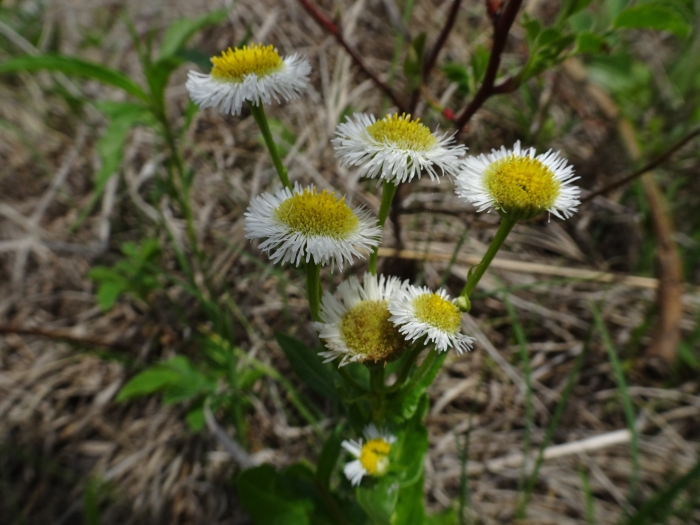Philadelphia Fleabane
(Erigeron philadelphicus)
Philadelphia Fleabane (Erigeron philadelphicus)
/
/

Thomas Koffel
CC BY 4.0
Image By:
Thomas Koffel
Recorded By:
Copyright:
CC BY 4.0
Copyright Notice:
Photo by: Thomas Koffel | License Type: CC BY 4.0 | License URL: http://creativecommons.org/licenses/by/4.0/ | Rights Holder: Thomas Koffel | Publisher: iNaturalist | Date Created: 2021-05-08T12:38:04-07:00 |






















Estimated Native Range
Summary
Erigeron philadelphicus, commonly known as Philadelphia fleabane, is a perennial herb native to a wide range of habitats including moist meadows, stream banks, and open woodlands across North America, and has been introduced to Eurasia. It typically grows to a height of 0.5–2.5 feet tall and features hairy stems and leaves that give it a somewhat rough texture. The plant is characterized by its daisy-like flowers, which have a profusion of narrow pink or white ray florets surrounding a center of yellow disc florets. These flowers are quite showy and bloom from late spring through early fall, peaking in May and June.
Philadelphia fleabane is valued for its long blooming period and its ability to attract pollinators such as bees and butterflies. It is often used in wildflower gardens, borders, and naturalized areas. This plant prefers full sun to partial shade and adapts well to a variety of soil conditions, though it thrives in moist, well-drained soils. While it is relatively low-maintenance, it can self-seed prolifically and may become weedy in favorable conditions. In some regions outside its native range, it is considered potentially invasive, so gardeners should consult local guidelines before planting.CC BY-SA 4.0
Philadelphia fleabane is valued for its long blooming period and its ability to attract pollinators such as bees and butterflies. It is often used in wildflower gardens, borders, and naturalized areas. This plant prefers full sun to partial shade and adapts well to a variety of soil conditions, though it thrives in moist, well-drained soils. While it is relatively low-maintenance, it can self-seed prolifically and may become weedy in favorable conditions. In some regions outside its native range, it is considered potentially invasive, so gardeners should consult local guidelines before planting.CC BY-SA 4.0
Plant Description
- Plant Type: Herb
- Height: 1-2.5 feet
- Width: 1-1.5 feet
- Growth Rate: Moderate
- Flower Color: White
- Flowering Season: Spring, Summer, Fall
- Leaf Retention: Deciduous
Growth Requirements
- Sun: Full Sun, Part Shade
- Water: Medium
- Drainage: Fast, Medium, Slow
Common Uses
Bee Garden, Butterfly Garden, Low Maintenance
Natural Habitat
Moist meadows, stream banks, and open woodlands across North America
Other Names
Common Names: Philadelphia Fleabane, Marsh Fleabane, Frostroot, Philadelphia Daisy, Robin’s-Plantain, Common Fleabane
Scientific Names: , Erigeron philadelphicus, Erigeron amplexicaulis, Erigeron amplexicaulis, Erigeron hyemalis, Erigeron philadelphicus f. angustatus, Erigeron philadelphicus f. philadelphicus, Erigeron philadelphicus f. purpureus, Erigeron philadelphicus f. scaturicola, Erigeron philadelphicus subsp. philadelphicus
GBIF Accepted Name: